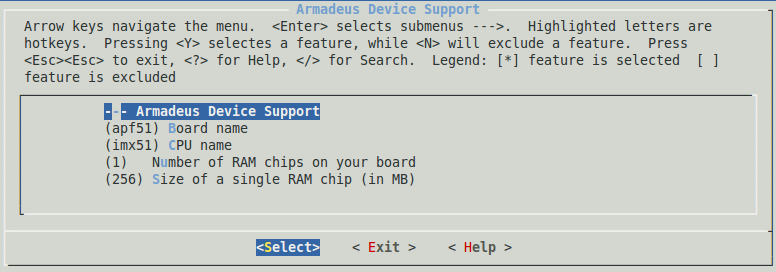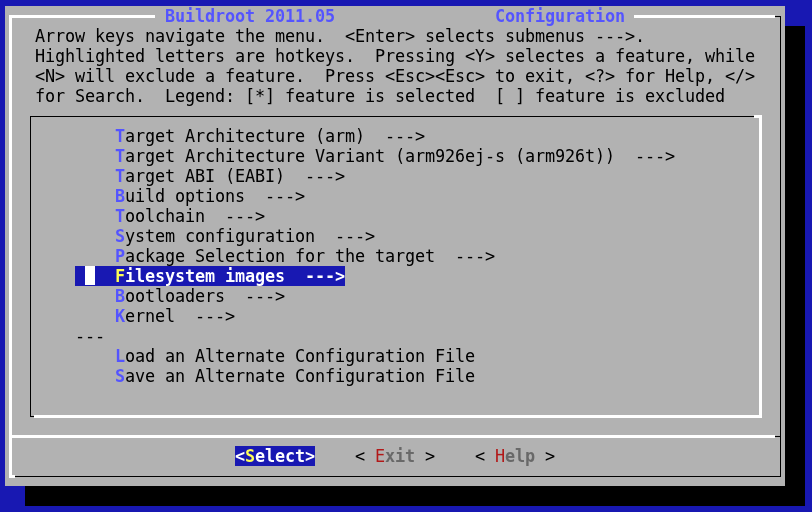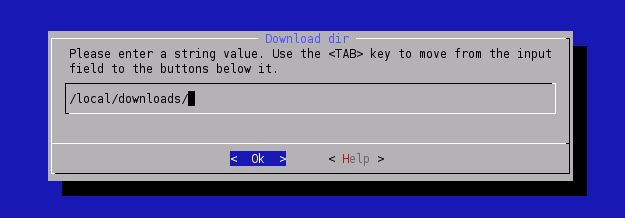Beginner's tutorial step 5
How-To install Armadeus "Software Development Kit" (SDK) aka "Board Support Package" (BSP) for Linux/Window$ Hosts.
Contents
[hide]Forewords
Before writing your first program or changing some of your system's utilities, you will need to build the tools required to compile them on your Host system (cross compilation). The GNU toolchain will be used.
Lexical
- Binutils: several GNU utilities to generate executable files
- Buildroot: set of Makefiles that allow to entirely build embedded Linux systems
- Busybox: "swiss knife" of the embedded Linux (regroup many common programs in one executable)
- GCC: GNU C compiler
- GDB: GNU debugger
- rootfs (root filesystem): filesystem image which will be installed on your target and used by Linux as root ("/") mountpoint.
- U-Boot: Bios / Bootloader
Recommended System Requirements
- HD free space: at least 5GiB
- 2GiB RAM is preferable
- 2GHz processor with a 533MHz FSB
- High speed Internet connection (1Mb/s)
With these settings, you will get a complete toolchain, Linux and the RootFS in about 1h30.
Installation on Linux Host
The installation was successfully tested on the following distributions:
- Debian Lenny (5.0), Squeeze (6.0.x), Wheezy (7.2), Jessie (8.0)
- X/KUbuntu Edgy Eft (6.10), Gutsy Gibbon (7.10), Hardy Heron (8.04) & Jaunty Jackalope (9.04)
- Ubuntu Lucid Lynx (10.04) (32 & 64bits), 12.04 LTS (32 & 64bits), 13.10 (32 & 64bits), 14.04, 15.04 & 16.04
- LUbuntu 17.10
- Mandriva 2006
- Fedora Core 3 & 4, Fedora 10, Laughlin (14)
- Red Hat Enterprise 5.2
- Gentoo 10.0 (32 & 64 bits)
- SuSE 10.1, OpenSUSE 11.3 - 12.3
The installation may fail on:
- Ubuntu Karmic Koala (9.10): tslib fails to build
APF28 requirements:
- APF28 board requires a Linux distribution with (GNU) tar version 1.20 or later to compile the Linux Kernel - Please update or upgrade your Linux distribution.
Prerequisites for Linux installation
| |
Note: From here we assume that your Linux system has a make version greater or equal to 3.81. To check it:
$ make -v GNU Make 3.81 ... |
For armadeus up to 3.4, make should be strictly make-3.81 (make-3.82 is too strict). A Fedora (14 and 15) -specific solution can be found later; other recent distributions such as mageia1 also have make-3.82, and a generic solution, based on configure&& make&& sudo make install can be used to install make-3.81 (which can be retrieved from http://ftp.gnu.org/gnu/make/make-6.81.tar.gz) in /usr/local/bin (and , according to one's PATH, make 3-81 can be invoked directly or as /usr/local/bin/make).
Depending on your distribution, some additional packages are required:
Debian/Ubuntu based systems
Ubuntu/Debian installation prerequisites
Mandriva based systems
Mandriva installation prerequisites
RPM-based systems (RedHat, Fedora, CentOS)
RedHat/Fedora installation prerequisites
OpenSuse based systems
OpenSuse installation prerequisites
Gentoo based systems
Gentoo installation prerequisites
Get Armadeus software
- If you are a "careful" user, then download the latest stable installation tarball from gitlab and detar it wherever you want:
$ tar xjvf armadeus-7.0.tar.bz2
- If you want the latest snapshot or if you have a recent SOM (OPOS6UL/OPOS8MM), the whole development tree can be checked out from our GIT repository.
$ git clone git@gitlab.com:armadeus/armadeus-bsp.git armadeus
- depending on your previous choice, a directory named armadeus/ or armadeus-7.0/ will be created on your hard-disk and will contain all the files you need.
Remarks:
- Do not use spaces in the directory name !
- Do not use a directory path beginning with /usr. It is a known bug of Buildroot (until BR2012.11, at 2012-12).
- GIT write/push accesses are limited to the integrators (JulienB, SebastienSz, Jorasse, FabienM, SebastienR)
Configure SDK/BSP options
| |
Note: If you are new to Armadeus and have troubles compiling armadeus-5.x/armadeus-6.x using the following instructions, you may find some hints here: Releases |
- Go to the directory where you put the Armadeus sources:
$ cd armadeus/ (or armadeus-7.0/)
- The first time you compile an Armadeus distribution you have to specify the target (here the APF9328) to work with.
$ make apf9328_defconfig
This command reloads the default configuration to support your target and automatically start a Buildroot's configuration menu.
- Current valid default configurations are:
apf9328_defconfig apf27_defconfig pps_defconfig apf28_defconfig apf51_defconfig pps51_defconfig apf6_defconfig apf6legacy_defconfig opos6ul_defconfig opos6ulnano_defconfig
For PPS boards, please see APF27_PPS or PPS51 Wiki pages, as these boards have specific build.
- After some downloads, you will get the Buildroot configuration interface:
| |
Note: If you ever made changes during the following steps, at any time, you can reload the default configuration with:
$ make xxx_defconfig (xxx depending on your module name) |
- If you are not familiar with Buildroot here are some tips:
- you can move the highlighted item with the "up"/"down" arrow keys
- with the "left"/"right" arrow keys you can choose between "Select", "Exit" or "Help" buttons
- "space"/"enter":
- selects the currently highlighted item if you are on the "Select" button
- go back in previous menu if you are on "Exit" button
- show you some Help for current item if you are on "Help" button
- for more Help about Buildroot commands, select "Help" in the main configuration screen
- Update the memory configuration of your board (if needed; by default BSP is configured for the minimal memory configuration available on the corresponding board):
- In menu:
System configuration ---> [*] Armadeus Device Support --->
- you can check and change the quantity of RAM available on your Armadeus board:

- For APF9328 the memory can be either 16 or 32MiB (be sure to select 1 RAM chip)
- For APF27 it could be either 64MiB or 128MiB (2 x 64MiB) (in that case be sure to select 2 chips of 64MiB instead of 1 chip of 128MiB).
- For APF51 it could be either 256MiB or 512MiB (2x256MiB) (in such case be sure to select 2 chips of 256MiB instead of 1 chip of 512).
- For APF28 The memory can be 128, 256, 512 or 1024MiB (be sure to select 1 RAM chip).
- For APF6/APF6SP The memory can be 512 Mbytes or 1Gbytes with ram chip size of 512Mbytes.
- For OPOS6UL/OPOS6UL_NANO The memory size is automatically detected so you don't care ;-)
- You may decrease the compilation time by increasing the number of parallel jobs running simultaneously on your system (the result is not guaranteed). This option is located in:
Build Options ---> (0) Number of jobs to run simultaneously
0 means that Buildroot will try to guess automatically how much parallel jobs it can launch.
- During the SDK/BSP build, a lot of software archives are downloaded from Internet. The downloaded files are put by default in the armadeus/downloads/ directory. If you have several views or plan to build the toolchain several times, we advise you to put all the downloaded files in /local/downloads (for example). This is done by configuring Buildroot to use this directory for all your views. Nevertheless, Buildroot will be downloaded separately for each build environment you set up.
| |
Note: Of course, /local/downloads should exists on your system and you should have writing rights on it ! |
- In recent Buildroot you can also use the following method:
export BR2_DL_DIR=/local/downloads
- After the build, we advise you to copy all the files in downloads/ / /local/downloads on a removable medium, in case you want to install the development tools on other systems, without to have to reload all the archives.
- Now, Exit the configuration tool and save your configuration
- You can come back to this configuration menu, by typing (your changes will be kept):
make menuconfig
Launch build
$ make
The toolchain and the full distribution are automatically built. During this procedure, several files are downloaded from Internet.
Please wait for a while.... it takes at least one hour for the first run!
By default, the downloaded files/tarball are put in the armadeus/downloads/ directory. Please see the previous chapter to know how to optimize that if you plan to build several views or want to build faster.
Enjoy the result
The generated binary files can be found in the subdirectory buildroot/output/images:
- apf9328-u-boot.brec (only on APF9328): BRecord image that can be used with the bootstrap, if U-Boot is not installed or not working (see BootLoader page)
- xxx-u-boot.bin: U-Boot image file to be used with U-Boot itself, (see updating U-Boot)
- xxx-linux.bin: Linux image to use with U-Boot, (see updating Linux)
- xxx-rootfs.jffs2: JFFS2 filesystem/rootfs image to use with U-Boot, (see updating rootfs)
- xxx-rootfs.ubi (not supported on APF9328): UBI filesystem/rootfs image to use with U-Boot, (see updating rootfs)
- xxx-rootfs.ext4: EXT4 filesystem/rootfs image to use with U-Boot, (on APF6 and OPOS6UL)
- xxx-rootfs.tar: for an NFS/MMC based rootfs, (see Booting from NFS & Booting from a MMC/SD)
Please note the new naming convention of binary files and directories (since Armadeus 4.0)
- buildroot/output/build: contains all the build results for target root filesystem, Linux, Busybox and U-Boot...
- buildroot/output/toolchain/: cross compilation toolchain's build dir. Binaries usable for cross-compilation are in buildroot/output/host/usr/bin.
- buildroot/output/target/: target filessytem before generating rootfs images
More information is available in the Buildroot's documentation
- Note: Previous versions (3.x) of Armadeus SDK stored the generated binary files at a different place: buildroot/binaries/XX/ (where XX was the name of your board).
Window$ and MacOS installation
There are 3 ways of having Armadeus SDK (Linux based) running on Window$ Hosts:
- Cygwin (not supported anymore)
- VMWare
- VirtualBox / QEmu x86
| |
Note: After a performance test with VMWare, it is clear that Cygwin won't be supported anymore. We have observed quite a factor 2 in terms of compilation improvements with VMWare |
So, on Window$ and MACOS Hosts, installing the SDK will summary in:
- install VMWare or VirtualBox,
- if you plan to configure your virtual machine as a server - TFTP, NFS.. - accessible by your armadeus board then change the virtual network adapteur configuration from NAT to bridged mode.
- an alternative solution is to install server services on your host OS - Window$ and MacOS
- install a Linux distribution on it (Ubuntu, Mandriva, Fedora, Gentoo,... as you like)
- and then follow Linux installation steps.
What are VMWare & Virtual Box ?
- They are virtualization tools able to run a standard Linux distribution on a native Window$ system or Window$ on a Linux native system.
- VMWare player is free. VMWare desktop (used to create the first virtual system) is available for evaluation. You need it only one time.
- VirtualBox is a Open Source software.
Be aware that VMWare/VirtualBox will require more disk space than cygwin, because a complete Linux distribution will be installed.
Windows installation with Cygwin (no more used)
| Navigation: | |
|---|---|
|
<< Previous step You are in step N°5 Next step >> | |

